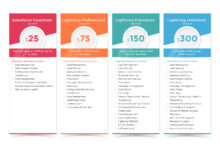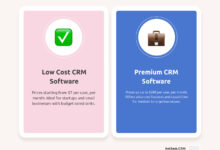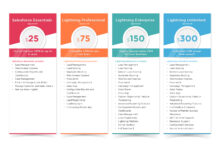Top Cloud-Based CRM Platforms: A Comprehensive Overview
Starting with Top Cloud-Based CRM Platforms, this article delves into the key features, benefits, and comparisons of leading CRM solutions in the market.
From Salesforce to HubSpot, Zoho, and more, discover how these platforms can revolutionize customer relationship management for businesses of all sizes.
Overview of Top Cloud-Based CRM Platforms
Cloud-based CRM platforms are customer relationship management systems that are hosted on the cloud, allowing businesses to access their customer data and tools through the internet. These platforms offer a wide range of features to help businesses manage their interactions with customers, streamline sales processes, and improve customer service.
Key Features of Cloud-Based CRM Platforms
- Centralized Data Storage: Cloud-based CRM platforms store all customer data in a centralized location, making it easily accessible to users from anywhere with an internet connection.
- Scalability: These platforms can easily scale up or down based on the needs of the business, allowing for flexibility as the company grows or changes.
- Automation: Cloud-based CRM platforms often include automation features for tasks such as lead scoring, email marketing, and customer follow-ups, helping to streamline processes and save time.
- Mobility: Users can access cloud-based CRM platforms from any device with an internet connection, making it convenient for sales teams on the go.
Benefits of Using Cloud-Based CRM Platforms for Businesses
- Cost-Effective: Cloud-based CRM platforms eliminate the need for expensive hardware and maintenance costs, making them a more affordable option for businesses.
- Accessibility: With cloud-based CRM platforms, employees can access customer data and tools from anywhere, at any time, increasing productivity and collaboration.
- Integration: These platforms often integrate with other business tools and applications, allowing for a seamless flow of data between different systems.
- Security: Cloud-based CRM platforms typically have advanced security features to protect customer data, ensuring compliance with data protection regulations.
Salesforce CRM
Salesforce CRM is a cloud-based customer relationship management platform that offers a wide range of features and functionalities to help businesses manage their customer relationships effectively.
Features and Functionalities
- Customizable dashboards and reports
- Lead and opportunity management
- Contact and account management
- Email integration
- Sales forecasting
- Workflow automation
- Mobile access
Comparison with Other CRM Platforms
When compared to other cloud-based CRM platforms, Salesforce CRM stands out due to its extensive customization options, scalability, and robust integrations with other business tools. For example, while platforms like HubSpot CRM may offer a more user-friendly interface, Salesforce CRM excels in its ability to handle complex sales processes and large amounts of data.
Industries Using Salesforce CRM
- Technology: Many tech companies use Salesforce CRM due to its scalability and ability to integrate with other tech tools.
- Financial Services: Banks, insurance companies, and financial institutions rely on Salesforce CRM for managing customer relationships and sales pipelines.
- Retail: Retail businesses use Salesforce CRM to track customer interactions, manage inventories, and analyze sales data.
- Healthcare: Healthcare organizations use Salesforce CRM to streamline patient interactions, manage appointments, and track medical histories.
HubSpot CRM
HubSpot CRM is a powerful cloud-based customer relationship management platform that offers a wide range of features to help businesses manage their contacts, track emails, and streamline their sales processes efficiently.
Contact Management, Email Tracking, and Pipeline Management
- HubSpot CRM provides robust contact management tools that allow users to organize and track interactions with leads and customers effectively.
- The email tracking feature enables users to monitor email opens, clicks, and responses, providing valuable insights into customer engagement.
- With pipeline management tools, businesses can visualize their sales process, track deals, and forecast revenue more accurately.
Integration of Marketing, Sales, and Service Tools
- HubSpot CRM seamlessly integrates marketing, sales, and service tools, enabling teams to work collaboratively and improve customer interactions.
- By combining these tools, businesses can create personalized marketing campaigns, track leads throughout the sales funnel, and provide exceptional customer service.
Pricing Structure
- HubSpot CRM offers different pricing plans based on the needs of businesses, with options for free, starter, professional, and enterprise tiers.
- Additional costs may apply for advanced features such as automation, reporting, and customizations.
Customization Options for Different Teams
- HubSpot CRM provides customization options for marketing, sales, and customer service teams, allowing each department to tailor the platform to their specific requirements.
- Teams can create custom fields, workflows, and reports to streamline their processes and improve efficiency.
Reporting and Analytics Capabilities
- HubSpot CRM offers robust reporting and analytics tools that enable businesses to track key performance metrics, analyze data trends, and make informed decisions.
- Users can generate detailed reports on sales activities, marketing campaigns, and customer interactions to optimize their strategies effectively.
- Customization: Zoho CRM provides extensive customization options, allowing businesses to tailor the platform to their specific needs. From custom fields and modules to workflow automation and reporting, Zoho CRM offers flexibility for businesses to create a CRM system that fits their unique requirements.
- Integration: Zoho CRM seamlessly integrates with a variety of third-party applications, making it easy for businesses to connect their CRM with other tools they use. This integration capability enhances the functionality of Zoho CRM and ensures a smooth workflow for businesses.
- Affordability: Zoho CRM offers different pricing plans to cater to businesses of all sizes, making it an affordable option for startups and small businesses. Despite its cost-effectiveness, Zoho CRM does not compromise on features and functionality, providing excellent value for money.
- Mobile Accessibility: Zoho CRM’s mobile app allows users to access their CRM data on the go, enabling sales teams to stay connected and productive even when they are away from their desks. This mobile accessibility feature enhances the efficiency and effectiveness of sales teams using Zoho CRM.
- Zoho CRM vs. Salesforce CRM: While Salesforce CRM offers extensive customization options, Zoho CRM provides a more user-friendly interface for businesses to customize their CRM system without the need for specialized technical knowledge. This makes Zoho CRM a great choice for businesses looking for a balance between flexibility and ease of use.
- Zoho CRM vs. HubSpot CRM: Zoho CRM offers more advanced customization options compared to HubSpot CRM, allowing businesses to create complex workflows and reports tailored to their specific needs. HubSpot CRM, on the other hand, focuses more on simplicity and ease of use, making it ideal for small businesses or those new to CRM systems.
- Sales: Manage leads, opportunities, and sales pipelines efficiently.
- Marketing: Create and execute marketing campaigns, track results, and generate leads.
- Customer Service: Provide excellent customer support and manage service cases effectively.
- Field Service: Schedule and dispatch field technicians, manage work orders, and optimize resources.
- Finance: Streamline financial operations, manage budgets, and analyze financial data.
- Custom Entities: Create custom entities to store specific data relevant to your business.
- Custom Fields: Add custom fields to existing entities to capture unique information.
- Workflows: Design automated workflows to streamline processes and increase efficiency.
- Permissions: Manage user permissions based on roles to control access to sensitive data.
- Security Roles: Assign security roles to users to define their level of access within the system.
- Customizable pipelines: Pipedrive allows users to create custom sales pipelines tailored to their specific needs and processes.
- Deal tracking: Users can easily track the progress of each deal, from initial contact to closing, ensuring no opportunities fall through the cracks.
- Contact management: The platform provides a centralized database for managing customer and lead information, making it easy to stay organized and follow up effectively.
- Activity reminders: Pipedrive sends reminders for important follow-ups and tasks, helping sales teams stay on top of their workload.
- Pipedrive streamlines lead management by allowing users to capture, qualify, and prioritize leads efficiently.
- The platform provides a visual representation of the sales pipeline, making it easy to identify bottlenecks and focus on deals that require immediate attention.
- Users can set goals and track progress towards them, helping to motivate sales teams and improve overall performance.
- Pipedrive’s reporting and analytics tools provide valuable insights into sales performance, allowing businesses to make data-driven decisions and optimize their processes.
- Automated lead scoring and routing to ensure sales teams focus on the most promising leads.
- Workflow automation to automate repetitive tasks and streamline processes.
- AI-powered chatbots for automated customer interactions and support.
- Customizable dashboards for real-time insights into sales performance and customer interactions.
- Advanced reporting features like sales forecasting and pipeline analysis.
- Integration with third-party analytics tools for deeper insights.
- Centralizing customer data for a 360-degree view of the customer.
- Automating follow-up emails and reminders to ensure timely communication.
- Personalizing customer interactions based on behavior and preferences.
- Create email templates with personalized content and branding elements.
- Schedule automated sends based on specific triggers or time intervals.
- Segment your contact list to target the right audience for each campaign.
- Track email performance metrics to optimize future campaigns.
- Install the Agile CRM tracking code on your website to capture visitor data.
- Identify leads by tracking their interactions and engagement with your site.
- Use lead scoring to prioritize high-quality leads for follow-up.
- Customizable sales pipeline stages to reflect your unique sales process.
- Automated lead assignment and routing for efficient lead management.
- Activity tracking and task management to ensure timely follow-ups and consistent communication with prospects.
- Regularly update and maintain lead and opportunity data for accurate forecasting.
- Create and assign tasks promptly to ensure timely follow-ups and engagement.
- Utilize reporting and analytics tools to identify bottlenecks and areas for improvement.
- Prospecting
- Qualification
- Needs Analysis
- Proposal/Quotation
- Negotiation
- Closed Won/Closed Lost
- Navigate to the settings or preferences section in Pipeline CRM.
- Locate the notifications or reminders tab and customize your preferences for different types of activities.
- Set the frequency and timing of reminders to align with your sales workflow.
- Mapping out your sales process and identifying key stages and milestones.
- Customizing pipeline stages, fields, and workflows to match your unique sales process.
- Integrating third-party tools and applications to enhance functionality and automation.
- Sugar Studio: Users can customize their CRM interface, including layouts, fields, and modules, without any coding knowledge.
- Workflow Automation: Businesses can automate repetitive tasks and define processes to streamline operations and improve efficiency.
- Integration Capabilities: SugarCRM integrates seamlessly with other applications and systems, allowing for a more comprehensive and connected ecosystem.
- Reporting and Analytics: Users can create custom reports and dashboards to track performance metrics and gain valuable insights into their business operations.
- Multi-Channel Support: SugarCRM offers support across various channels, including email, phone, and live chat, ensuring that customers can reach out for assistance through their preferred method.
- Knowledge Base: Users have access to a comprehensive knowledge base that provides answers to common queries and troubleshooting tips, reducing the need for direct support requests.
- Community Forums: SugarCRM hosts community forums where users can interact, share best practices, and seek advice from other users and experts.
- Integration with email marketing software for targeted campaigns and lead nurturing.
- Compatibility with accounting software for seamless financial data management.
- Integration with customer support systems for enhanced customer service and issue resolution.
- Research and prioritize CRM platforms that offer integrations with your existing business tools.
- Ensure the CRM platform supports popular integrations and has a robust API for custom integrations.
- Consult with the CRM provider to understand the integration process and compatibility with your specific tools.
- Enhanced workflow efficiency and productivity.
- Improved data accuracy and consistency across systems.
- Streamlined communication and collaboration among teams.
- Open API for custom integrations.
- Pre-built integrations with popular business tools.
- Data mapping and synchronization capabilities.
Zoho CRM
Zoho CRM is a cloud-based customer relationship management platform that offers a wide range of features to help businesses manage their customer interactions effectively. With its user-friendly interface and customizable options, Zoho CRM has become a popular choice for businesses of all sizes.
Unique Selling Points of Zoho CRM
Comparison of Customization Options
Successful Implementations of Zoho CRM
Zoho CRM has been successfully implemented in various businesses across different industries, leading to improved customer relationships, streamlined sales processes, and increased productivity. For example, a tech startup used Zoho CRM to track leads and manage customer interactions, resulting in a 20% increase in sales within the first year of implementation. Additionally, a manufacturing company utilized Zoho CRM to automate their sales pipeline and improve forecasting accuracy, leading to a 15% growth in revenue. These examples highlight the versatility and effectiveness of Zoho CRM in driving business success.
Microsoft Dynamics 365
Microsoft Dynamics 365 is a comprehensive cloud-based CRM platform that offers various modules to cater to different business needs. Let’s explore some key aspects of Microsoft Dynamics 365.
Modules in Microsoft Dynamics 365
Customization Options in Microsoft Dynamics 365
Reporting and Analytics Features
Microsoft Dynamics 365 offers robust reporting and analytics capabilities, allowing users to visualize data and gain valuable insights. Users can create custom reports, dashboards, and charts to track key performance indicators and make informed decisions.
Role-Based Security Model
Industry-Specific Solutions
Microsoft Dynamics 365 can be tailored to meet the unique requirements of various industries. For example, in the healthcare sector, it can be used to manage patient data and appointments effectively. In the retail industry, it can help track customer interactions and analyze buying patterns for targeted marketing campaigns.
Oracle CX
Oracle CX is a cloud-based CRM platform that offers a wide range of features to help businesses manage their customer relationships effectively. Let’s take a closer look at how Oracle CX compares to Salesforce and HubSpot in terms of key features and functionality.
Feature Comparison with Salesforce and HubSpot
When comparing Oracle CX with Salesforce and HubSpot, Oracle CX stands out for its robust marketing automation tools. While Salesforce and HubSpot also offer marketing automation capabilities, Oracle CX provides advanced features such as AI-driven personalization, predictive analytics, and omnichannel marketing automation. These tools enable businesses to create highly targeted marketing campaigns and deliver personalized experiences to their customers at scale.
Key Differences in Marketing Automation Tools
To better understand the differences between Oracle CX and its competitors in terms of marketing automation tools, let’s outline the key features in a table:
| Feature | Oracle CX | Salesforce | HubSpot |
|---|---|---|---|
| AI-driven Personalization | Yes | No | No |
| Predictive Analytics | Yes | No | No |
| Omnichannel Marketing Automation | Yes | Yes | No |
Integration with Oracle Cloud Products
Oracle CX integrates seamlessly with other Oracle cloud products such as ERP (Enterprise Resource Planning) and HCM (Human Capital Management) to provide a unified view of customer data across different departments. This integration allows businesses to streamline their operations, improve collaboration, and deliver a seamless customer experience.
Personalization and Customization
Oracle CX prioritizes personalization and customization in its CRM solutions by offering a wide range of tools and features that enable businesses to tailor their interactions with customers based on individual preferences and behaviors. From creating personalized marketing campaigns to customizing workflows and reports, Oracle CX empowers businesses to create unique and engaging customer experiences.
Pipedrive
Pipedrive is a popular cloud-based CRM platform known for its sales-focused features and user-friendly interface. It offers a range of tools to help businesses manage their sales pipeline efficiently and close deals effectively.
Sales-focused Features of Pipedrive CRM
Managing Leads and Deals with Pipedrive CRM
Customer Reviews and Testimonials
“Pipedrive has transformed the way we manage our sales process. The intuitive interface and powerful features have helped us close more deals and increase our revenue.” – John, Sales Manager
“I love how easy it is to customize pipelines and track deals in Pipedrive. It has made a significant impact on our sales team’s productivity and effectiveness.” – Sarah, Marketing Director
Freshworks CRM
Freshworks CRM is a cloud-based customer relationship management platform that offers a range of automation capabilities to streamline processes and enhance efficiency in managing customer relationships.
Automation Capabilities
Reporting and Analytics Tools
Freshworks CRM provides robust reporting and analytics tools to help businesses track and analyze key metrics to make informed decisions. Compared to other platforms, Freshworks CRM offers:
Streamlining Customer Engagement Processes
Freshworks CRM streamlines customer engagement processes by:
Insightly
Insightly is a popular cloud-based CRM platform that offers robust project management features integrated into its system. Let’s delve into some key aspects of Insightly CRM.
Project Management Features
Insightly CRM provides a comprehensive set of project management tools that allow users to create and manage projects seamlessly. Users can set milestones, track progress, allocate resources, and collaborate with team members effectively.
Relationship Mapping and Lead Routing
Insightly CRM supports relationship mapping by allowing users to visualize and track connections between contacts, organizations, and opportunities. Lead routing functionality ensures that leads are assigned to the right sales representatives based on predefined criteria, improving efficiency and conversion rates.
Mobile Accessibility for Remote Teams
Insightly CRM offers a mobile app that enables remote teams to access and update customer data, manage tasks, and communicate on-the-go. This mobile accessibility enhances productivity and ensures that team members stay connected even when working remotely.
Task Automation Capabilities
Insightly CRM provides robust task automation features that streamline repetitive tasks, such as sending follow-up emails, updating contact information, and assigning tasks to team members. These automation capabilities save time and improve overall efficiency.
Customization Options for Personalized Dashboards
Insightly CRM offers extensive customization options, allowing users to create personalized dashboards tailored to their specific needs and preferences. Users can choose the layout, widgets, and data visualizations to create a dashboard that provides a snapshot of key metrics and insights.
Reporting and Analytics Tools
Insightly CRM offers advanced reporting and analytics tools that enable users to track team performance, monitor sales pipelines, and identify trends. Users can generate custom reports, visualize data with charts and graphs, and gain valuable insights to make informed decisions.
Third-Party Integrations
Insightly CRM integrates seamlessly with a variety of third-party applications to enhance its functionality. Some popular integrations include Mailchimp for email marketing, QuickBooks for accounting, and Slack for team communication. These integrations expand the capabilities of Insightly CRM and streamline workflows for users.
Agile CRM
Agile CRM is a cloud-based CRM platform that offers a variety of tools to help businesses manage customer relationships effectively. One of the key features of Agile CRM is its ability to streamline email marketing campaigns, track website visitors and leads, and prioritize leads through lead scoring.
Setting up an Email Marketing Campaign in Agile CRM
To set up an email marketing campaign in Agile CRM, follow these steps:
Tracking Website Visitors and Leads in Agile CRM
Agile CRM provides tracking tools to monitor website visitors and leads. Here’s how you can track them:
Comparing Lead Scoring Capabilities
Agile CRM’s lead scoring capabilities help businesses prioritize leads based on their engagement and interactions. Compared to other CRM platforms, Agile CRM offers a customizable lead scoring system that allows businesses to assign values to different actions and behaviors, helping them focus on leads that are more likely to convert into customers.
Pricing Plans Comparison
Here is a comparison table of Agile CRM pricing plans with similar CRM software on the market:
| CRM Platform | Basic Plan | Standard Plan | Advanced Plan |
|---|---|---|---|
| Agile CRM | $X/month | $Y/month | $Z/month |
| Competitor 1 | $X/month | $Y/month | $Z/month |
| Competitor 2 | $X/month | $Y/month | $Z/month |
Case Study: Small Business Success with Agile CRM
A small business implemented Agile CRM’s customer engagement tools and saw a significant increase in sales. By utilizing Agile CRM’s email marketing features, lead tracking capabilities, and lead scoring system, the business was able to target the right audience, nurture leads effectively, and convert them into loyal customers, resulting in a boost in revenue and overall business growth.
Pipeline CRM
Pipeline CRM is a robust customer relationship management platform that offers a wide range of pipeline management tools to streamline the sales process and drive revenue growth for businesses of all sizes.
Pipeline Management Tools in Pipeline CRM
Sales Forecasting and Performance Tracking
Pipeline CRM enhances sales forecasting by providing real-time visibility into the sales pipeline, allowing sales teams to identify trends, forecast revenue accurately, and make informed decisions. Performance tracking features enable sales managers to monitor individual and team performance, track key metrics, and optimize sales strategies.
Optimizing Usage for Sales Teams
Sales Pipeline Stages in Pipeline CRM
Pipeline CRM allows users to set up various sales pipeline stages based on their sales process. These stages typically include:
Key Metrics for Sales Performance Evaluation
Key metrics that can be tracked and analyzed using Pipeline CRM include lead conversion rates, sales cycle length, win rate, average deal size, and sales velocity.
Setting Up Automated Reminders and Notifications
To set up automated reminders and notifications for sales activities in Pipeline CRM, follow these steps:
Customizing Pipeline CRM for Specific Sales Processes
To customize Pipeline CRM to align with specific sales processes and workflows, consider:
SugarCRM
SugarCRM is a cloud-based CRM platform that offers a wide range of customization options to cater to different business needs. Businesses can tailor their CRM system to fit their specific requirements, whether it’s in sales, marketing, customer service, or other areas. The flexibility of SugarCRM allows companies to create workflows, modules, fields, and dashboards that align with their unique processes and goals.
Customization Options in SugarCRM
Customer Support Features in SugarCRM
Customer Engagement and Retention with SugarCRM
SugarCRM plays a crucial role in improving customer engagement and retention through personalized communication, targeted marketing campaigns, and efficient customer service. By leveraging the customization options and automation features of SugarCRM, businesses can create meaningful interactions with customers, anticipate their needs, and build long-lasting relationships that drive loyalty and satisfaction.
Nimble CRM
Nimble CRM is a powerful cloud-based customer relationship management platform that stands out for its exceptional social media integration capabilities and user-friendly interface.
Social Media Integration
Nimble CRM excels in integrating social media platforms such as LinkedIn, Twitter, and Facebook directly into its system. This allows users to easily access and engage with their contacts’ social media profiles, helping to create a more personalized and meaningful interaction.
Building and Nurturing Customer Relationships
Nimble CRM is designed to streamline the process of building and nurturing customer relationships. By consolidating contact information, activity history, and communication channels in one place, Nimble enables users to stay organized and responsive. The platform also provides insights into customer behavior and preferences, empowering users to tailor their interactions for maximum impact.
User Interface and Ease of Use
Nimble CRM offers a clean and intuitive user interface that makes it easy for users to navigate and utilize its features efficiently. With customizable dashboards, automated workflows, and seamless integration with popular tools like Google Workspace and Microsoft 365, Nimble ensures a smooth user experience for individuals and teams alike.
Integrations and Compatibility
When it comes to cloud-based CRM platforms, integrations play a crucial role in enhancing overall efficiency and productivity within a business. Seamless integration with other essential business tools is key to streamlining workflows and maximizing the benefits of a CRM system.
Common Integrations Offered
Importance of Seamless Integration
Having a cloud-based CRM platform that seamlessly integrates with other tools ensures smooth data flow and eliminates the need for manual data entry across multiple systems. This leads to improved accuracy, efficiency, and collaboration among different departments.
Tips for Ensuring Compatibility
Setting up Integrations
Setting up integrations between a cloud-based CRM platform and other business tools involves configuring API connections, mapping data fields, and testing the integration for smooth operation. Each integration may have specific setup requirements that need to be followed for successful implementation.
Benefits of Smooth Integration
Features to Look for in CRM Platforms
Successful Integration Strategies
One example is a company integrating their CRM platform with email marketing software to automatically sync customer data and track campaign performance, leading to more targeted marketing efforts and improved ROI.
Last Word
In conclusion, the world of cloud-based CRM platforms offers a plethora of options to streamline customer interactions and drive business growth.




